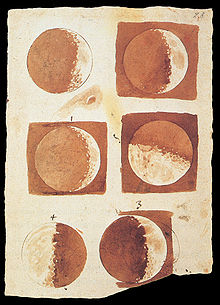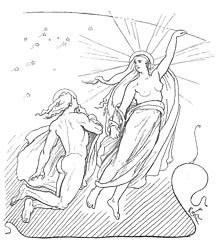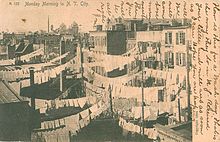- Monday
-
 Galileo's 1616 drawings of the Moon and its phases. Monday is named after the Moon in many languages.
Galileo's 1616 drawings of the Moon and its phases. Monday is named after the Moon in many languages.
Monday (
 i/ˈmʌndeɪ/ or /ˈmʌndi/) is the day of the week between Sunday and Tuesday. According to international standard ISO 8601 it is the first day of the work week. According to the Islamic and Hebrew calendars, Sunday is the first day of the week. The name of Monday is derived from Old English Mōnandæg and Middle English Monenday, which means "moon day".
i/ˈmʌndeɪ/ or /ˈmʌndi/) is the day of the week between Sunday and Tuesday. According to international standard ISO 8601 it is the first day of the work week. According to the Islamic and Hebrew calendars, Sunday is the first day of the week. The name of Monday is derived from Old English Mōnandæg and Middle English Monenday, which means "moon day".Contents
Etymology
 A depiction of Máni, the personified moon, and his sister Sól, the personified sun, from Norse mythology (1895) by Lorenz Frølich.
A depiction of Máni, the personified moon, and his sister Sól, the personified sun, from Norse mythology (1895) by Lorenz Frølich.
The English noun Monday derived sometime before 1200 from monedæi, which itself developed from Old English (around 1000) mōnandæg and mōndæg (literally meaning "moon's day"), which is cognate to other Germanic languages, including Old Frisian mōnadeig, Middle Low German and Middle Dutch mānendach (modern Dutch Maandag), Old High German mānetag (modern German Montag), and Old Norse mánadagr (Swedish and Norwegian nynorsk måndag, Icelandic mánudagur. Danish and Norwegian bokmål mandag). The Germanic term is a Germanic interpretation of Latin lunae dies ("day of the moon").[1]
In most Indic languages, the word for Monday is derived from Sanskrit Sōmavāra.[2] Soma is another name of the Moon god in Hinduism. In Indic languages it is also called Chandravāra, Chandra in Sanskrit means moon. In Thailand the day is called "Wan Jan" meaning, the day of the Moon god Chandra".
In many Slavic languages the name of the day eschews pagan tradition and translates as "after Sunday/holiday". Russian понедельник (poniediélnik), Serbian понедељак (ponedeljak), Bulgarian понеделник (ponedelnik), Polish poniedzialek, Czech pondělí. In Turkish it is called pazartesi, which means the day after Sunday. Japanese and Korean share the same ancient Chinese words '月曜日' (Hiragana:げつようび, Hangul:월요일) for Monday which means day of the moon.
Position in the week
The international ISO 8601 standard places Monday as the first day of the week, and this is widely used on calendars in Europe and in international business. Monday is xīngqīyī (星期一) in Chinese, meaning "day one of the week". Its name in Georgian and Syriac means "first day". Modern western culture usually looks at Monday as the beginning of the workweek, as it is typically Monday when adults go back to work and children go back to school after the weekend.
Jewish and some Christian traditions place Sunday as the first day of the week, and Monday is thus the second day of the week. This is the standard format in the United States, Canada, Japan and Israel. Quakers traditionally refer to Monday as "Second Day" eschewing the pagan origin of the English name "Monday". For similar reasons the official liturgical calendar of the Roman Catholic Church refers to Monday as the second celebration day - Feria II. The Portuguese and the Greek (Eastern Orthodox Church) name for Monday reflects this, as do all the days' names except Saturday and Sunday: the Portuguese word for Monday is segunda-feira and the Greek word is deutéra (Δευτέρα). Likewise the Hebrew name for Monday is yom-sheni (יום שני).
Religious observances
In Judaism and Islam Mondays are considered auspicious days for fasting. The Didache warned early Christians not to fast on Mondays to avoid Judaizing, and suggests Wednesdays instead.
In Judaism the Torah is read in public on Monday mornings, one of three days the Torah is read each week (the other two days being Thursday and Saturday). Special penitential prayers are recited on Monday, unless there is a special occasion for happiness which cancels them.
In the Eastern Orthodox Church Mondays are days on which the Angels are commemorated. The Octoechos contains hymns on this theme, arranged in an eight-week cycle, that are chanted on Mondays throughout the year. At the end of Divine Services on Monday, the dismissal begins with the words: "May Christ our True God, through the intercessions of his most-pure Mother, of the honorable, Bodiless Powers (i.e., the angels) of Heaven…". In many Eastern monasteries Mondays are observed as fast days; because Mondays are dedicated to the angels, and monks strive to live an angelic life. In these monasteries the monks abstain from meat, fowl, dairy products, fish, wine and oil (if a feast day occurs on a Monday, fish, wine and oil may be allowed, depending upon the particular feast).
In Islam Monday was the day that Muhammad used to fast on, as this was the day he was born.
The Church of Jesus Christ of Latter-day Saints spend one evening per week called Family Home Evening (FHE) or Family Night usually Monday, that families are encouraged to spend together in study, prayer and other wholesome activities. Many Businesses owned by Latter-Day Saints close early on Mondays so they and their customers are able to spend more time with their families.
Cultural references
In the folk rhyme, "Monday's child is fair of face".
In Thailand, the color associated with Monday is yellow, see Thai solar calendar.
A number of songs feature Monday, often as a day of depression, anxiety, or melancholy. For example, "Monday, Monday" (1966) from the Mamas & the Papas, "Rainy Days and Mondays" (1971) from the Carpenters, "I Don't Like Mondays" (1979) from the Boomtown Rats, and "Manic Monday" (1986) from the Bangles.
There is a band named the Happy Mondays and an American pop punk band Hey Monday.
In the Garfield comics and shows, the title character hates Mondays, and is frequently harmed during them.
Monday is the most popular day to commit suicide,[3] call in sick,[4] and surf the web[5] in the Netherlands.
During July 2002, the consulting firm of PriceWaterhouseCoopers Consulting announced that it would re-name itself to Monday, and spend $110 million over the next year to establish that brand.[6]
In the film Office Space (1999), character Nina says to Peter "sounds like someone's got a case of the Mondays" suggesting Peter is not in a good mood.
Monday in different languages
See the main article Week-day names.
Astrology
Monday aligns with the celestial body, the Moon, and the astrological sign of Cancer, and is represented by the symbol of the Moon, ☾.
Named days
- Big Monday
- Black Monday
- Blue Monday
- Clean Monday (Ash Monday)
- Cyber Monday
- Easter Monday also Bright Monday or Wet Monday
- First Monday
- Handsel Monday
- Lundi Gras
- Mad Monday
- Miracle Monday
- Plough Monday
- Shrove Monday
- Weather Market Monday. The day when commodity markets add or subtract weather premium.
- Wet Monday
- Whit Monday
See also
- Monday Club
- Monday demonstrations
- Monday Night Football
- Monday Night Wars
- Monday Night Raw
- Saint Monday
Notes
- ^ Barnhart (1995:485).
- ^ Turner, Sir Ralph Lilley (1962). "sōmavāra 13610". A comparative dictionary of the Indo-Aryan languages. London: Oxford University Press. Digital Dictionaries of South Asia, University of Chicago. p. 784. http://dsal.uchicago.edu/cgi-bin/philologic/contextualize.pl?p.4.soas.773773. Retrieved 21 February 2010. "sōmavāra 13610 sōmavāra masculine 'Monday' inscription [sṓma the plant, vāra 2 meaning day]"
- ^ Carvel, John (26 August 2005). "Monday is most common day for suicide". The Guardian (London). http://www.guardian.co.uk/society/2005/aug/26/health.medicineandhealth1.
- ^ [1]
- ^ [2]
- ^ [3]
References
- Barnhart, Robert K. (1995). The Barnhart Concise Dictionary of Etymology. Harper Collins. ISBN 0-06-270084-7
Days of the week Categories:- Monday
- Days of the week
- Eastern Christian liturgy
- Fasting
Wikimedia Foundation. 2010.

